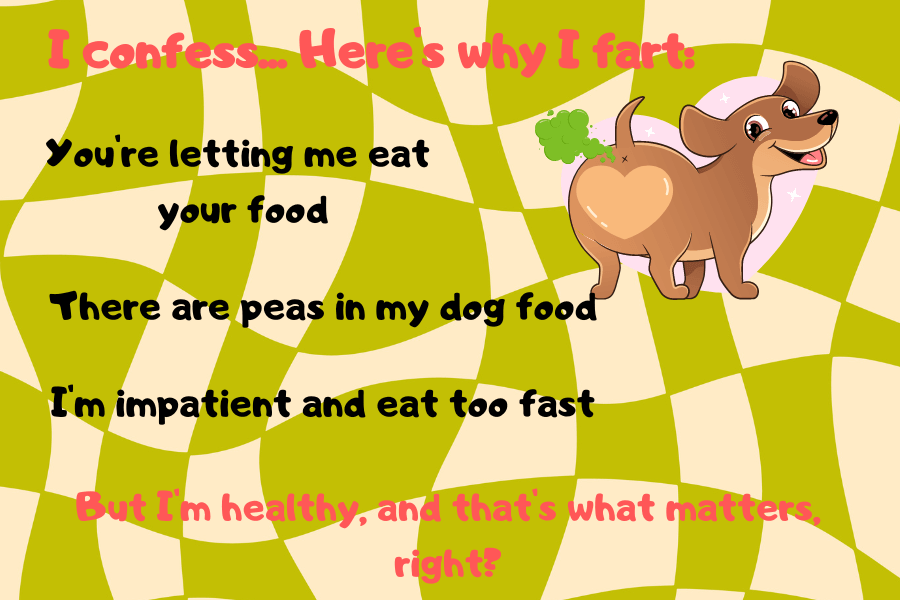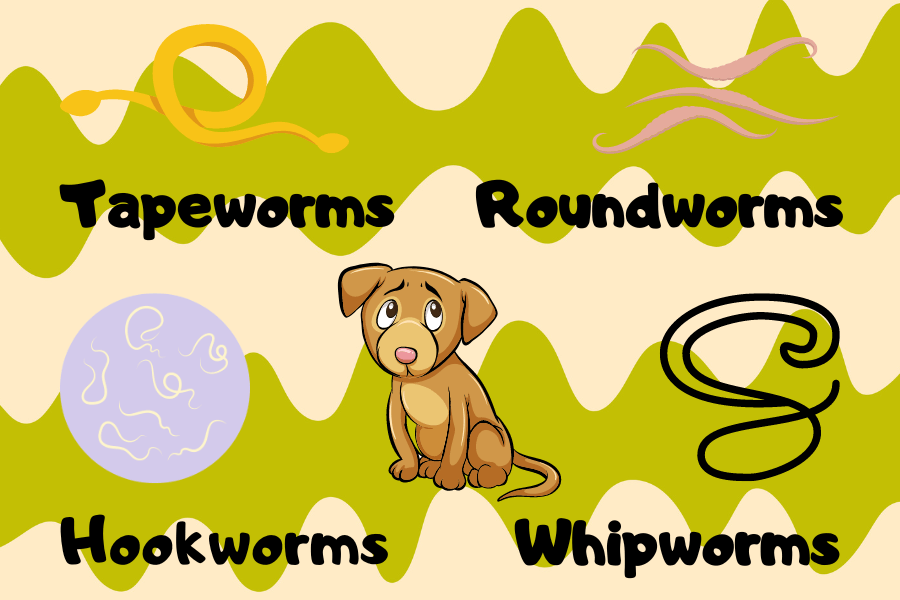Potential Causes
- Normal flatulence
- Poor digestion
- Low-quality diet
- Short snout
- Eating too fast
- Lactose intolerance
- Parasites
- GI problems
If you’ve ever been around a dog when it’s having a “moment,” you know that they can let out some powerful farts. „Why does my dog fart so much?” you wonder. What can cause gas problems in dogs? And how can you help your pooch if they’re having trouble passing gas? Find out all this and more!
Even Healthy Dogs Fart Sometimes
Why does my dog fart so much? Keep in mind that all dogs fart. In fact, it’s perfectly normal for your pet to pass gas every day (the average human does it 4–18 times a day, so why shouldn’t dogs?). So the answer is probably just that they’re healthy and normal.
However, some dogs do seem to fart more than others. If your dog is constantly passing smelly gas, it could be a sign that there’s something going on with their digestive system. Read on to learn about some of the most common causes of gas in dogs and what you can do about them.
But My Dog Is Farting So Much!
If your dog is farting more than 18 times a day, it could be a sign that they’re having trouble digesting their food. Dogs with digestive problems tend to have difficulty absorbing all the nutrients from their food. This can lead to gas, diarrhea, and weight loss. If you think your dog might have a digestive problem, take them to the vet so they can get the treatment they need.
Some Breeds Fart More
Just like people, some dogs are just gassier than others. If you’re wondering “why does my dog fart so much”, it could be due to their breed. Breeds that are known for being gassy include:
- Pugs;
- Boston Terriers;
- Bulldogs;
- Boxers;
- Labrador Retrievers;
- Golden Retrievers;
- German Shepherds;
- Siberian Huskies.
There are a few possible explanations for why some breeds are gassier than others. It may have to do with their short-nosed build (like in brachycephalic breeds). Dogs with shorter snouts often swallow air, which can lead to excessive gas. The other breeds are simply more prone to digestive issues.
Whatever the reason, if you have a gassy dog, there’s not much you can do about it except try to manage the problem (more on that later).
Dog Food Can Be a Reason
Why does my dog fart so much? The type of food you’re feeding your dog can also be a factor in how much they fart. If you’ve ever wondered “why does my dog fart so much?”, it might be because they’re eating the wrong food, such as:
- cheap, low-quality canine food;
- food that’s high in fillers or grains;
- human food;
- table scraps.
Eating Too Fast Can Cause Excess Gas in Dogs
Another possible reason for “why does my dog fart so much?” is that they eat too fast and swallow air. Dogs that gulp their food down without chewing properly are also more likely to have trouble digesting it, which can lead to gas.
There are a few ways you can help your dog slow down at mealtime, including:
- investing in a slow feeder bowl;
- putting a tennis ball in their bowl (they’ll have to move the ball around to get to the food);
- splitting their meals into smaller portions and feeding them multiple times a day.

Why does my dog fart so much? Read on to know more possible reasons!
Dietary Changes for Dogs With Gas Problems
If your dog is gassy, there are a few things you can do to help them feel better. First, try making some dietary changes. For example, you might want to:
- avoid feeding them human food;
- limit their intake of high-fat foods;
- feed them smaller meals more often throughout the day;
- avoid feeding them peas, soybeans, and spicy foods;
- add more fiber to their diet to help with digestion.
These dietary changes can help your dog’s digestive system run more smoothly and reduce the amount of gas they produce. Food like brussels sprouts, broccoli, and cauliflower can also cause flatulence in dogs.
Your Dog Might Be Lactose Intolerant
Why does my dog fart so much? A common cause of gas in dogs is lactose intolerance. Just like some people, some dogs can’t digest lactose properly. This can lead to diarrhea, vomiting, and flatulence.
If you think your dog might be lactose intolerant, there are a couple of things you can do. First, try eliminating all dairy products from their diet. You might also want to talk to your veterinarian about switching to a lactose-free dog kibble.
Editor’s Note ✏️
Milk and its products are often added to dog treats, so don’t forget to check the label on those as well! A friend of mine knew that her dog was lactose intolerant, and he kept having symptoms for a long time after switching to a lactose-free dog food. She started to suspect that he was getting into the trash or something, but it turned out that his bone-shaped treats were the problem.
Intestinal Parasites
Intestinal parasites are another possible cause of gas in dogs. These parasites can live in your dog’s intestinal tract or colon and interfere with their ability to digest food properly. This can lead to a variety of digestive problems, including flatulence.

Why Does My Dog Fart So Much? Gastrointestinal Issues in Dogs
If your dog has gas that’s accompanied by other digestive problems, such as diarrhea, vomiting, or loss of appetite, it could be a sign of an underlying gastrointestinal issue. Some common GI problems in dogs include:
- gastroenteritis;
- exocrine pancreatic insufficiency;
- parvovirus;
- inflammatory bowel disease.
Your vet will be able to run some tests and determine what’s causing the problem.
Smelly Farts – What Can You Do?
Why does my dog fart so much? Why does it stink so much? If your dog’s gas is very stinky, there are a few things you can do to neutralize the odor. For example, you might want to try:
- adding probiotics to their diet;
- feeding them pumpkin or sweet potato;
- giving them activated charcoal.
Probiotics can help improve your dog’s gut health, while pumpkin and sweet potato can help soothe their digestive system. Activated charcoal can also help absorb some of the gas-producing compounds in your dog’s gut.
Flatulence in Dogs – Is It a Good Time to Contact Your Vet?
In most cases, flatulence is nothing to worry about. However, if your dog’s gas is accompanied by other symptoms, such as diarrhea, vomiting, or lack of appetite, it could be a sign of an underlying medical condition. If you’re concerned about your dog’s gas, ask a vet to help you figure out what’s causing the problem and recommend treatment options.
Why does my dog fart so much? Now you know all about canine flatulence. Thanks for reading!
FAQs About Dog Farts
Is It Normal for My Dog to Fart a Lot?
It depends on what you mean by „a lot.” It’s usual for a dog to fart a couple or a dozen times per day. If your dog seems to be farting more than this, it could mean that something else is going on and you should consult with a vet.
What Food Makes Dogs Fart?
Dogs are more prone to have flatulence while eating high-protein diets that are challenging to digest. Beans, lentils, broccoli, cauliflower, and cabbage are other foods that can upset your dog’s stomach.
Do Dogs Feel When They Fart?
They probably do, just like people. They have nerve endings in their anus that allow them to feel when they’re passing gas. In addition, they can definitely smell their own farts – their noses detect hydrogen sulfide.
What Food Reduces Dog Gas?
Flaxseed, probiotic treats, ginger, turmeric, and lean protein are all wonderful additions to a gassy dog’s diet. If you feed your dog a commercial diet, switch to one with fewer fillers and other ingredients that may be difficult for them to digest. You can also add a few drops of digestive enzymes to their meals to help with gas reduction. Lastly, make sure your dog exercises frequently enough to improve digestion.
Do Worms Cause Gas in Dogs?
Yes, worms can cause gas and bloating in your dog. Roundworms, besides diet, are the main offender. Take your dog to the vet for a checkup if you discover that they’re having gas problems. The veterinarian can determine what kind of worm it is and recommend the right course of action. To get rid of any parasites that might be the source of your pet’s gas problems, your veterinarian may occasionally advise using a dewormer.
Sarah Jameson is a journalist, reporter and a pet nutritionist. She is married to Peter, and they have two beautiful children, Zoey and Quinn. In her spare time, Sarah enjoys cooking for her family and playing snooker. She also loves spending time with her Scottish Terrier, Bobby.












